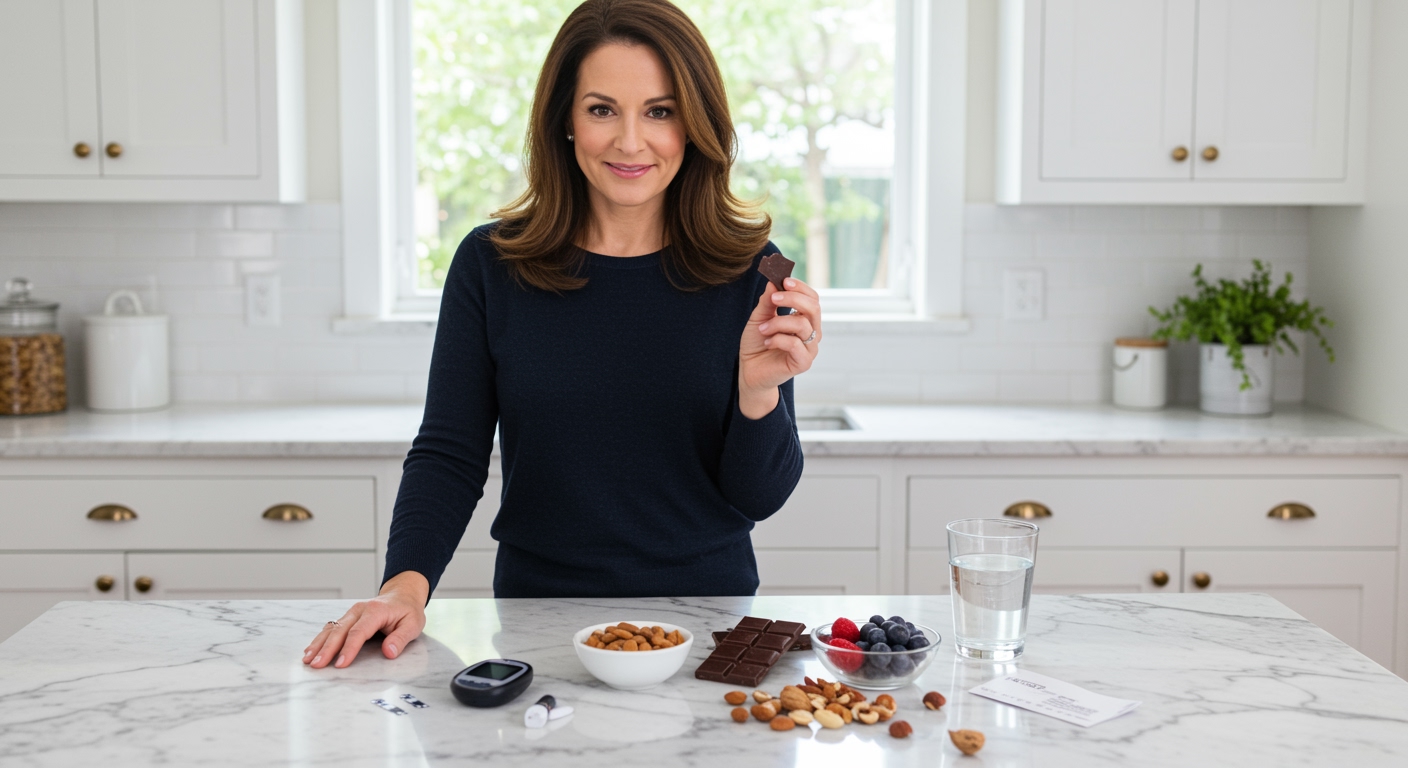✪ Key Takeaway: Dark chocolate with 70% or higher cocoa content may actually help reduce diabetes risk when eaten in small amounts.
Introduction
You stare at that piece of dark chocolate and wonder if it will send your blood sugar through the roof.
Many people with diabetes feel confused about chocolate because they hear conflicting advice from doctors, friends, and the internet.
Hi, I’m Abdur, your nutrition coach and today I’m going to explain exactly how dark chocolate affects your blood sugar and whether you can safely enjoy it with diabetes.
Does Dark Chocolate Raise Blood Sugar?
Dark chocolate does raise blood sugar, but much less than milk chocolate or white chocolate.
The glycemic index of dark chocolate ranges from 23 to 25, which puts it in the low category.
This means dark chocolate causes a slower and smaller rise in blood glucose compared to other sweet treats.
The higher the cocoa content, the lower the sugar content and the gentler the impact on your blood sugar.
A one-ounce piece of 70% dark chocolate contains about 6-8 grams of sugar, while the same amount of milk chocolate contains 15-17 grams.
The fiber and fat in dark chocolate also slow down sugar absorption, preventing sharp spikes in glucose levels.
✪ Pro Tip: Choose dark chocolate with at least 70% cocoa content for the lowest blood sugar impact.
Can Dark Chocolate Actually Prevent Diabetes?
Recent research suggests that eating dark chocolate regularly might actually reduce your risk of developing type 2 diabetes.
A large Harvard study following over 190,000 people found that those who ate dark chocolate had a 21% lower risk of developing type 2 diabetes.
The flavonoids in dark chocolate, particularly epicatechin and catechin, improve insulin sensitivity in your cells.
These compounds help your muscles and liver respond better to insulin, making it easier for your body to control blood sugar.
Dark chocolate also contains magnesium, a mineral that plays a crucial role in glucose metabolism and insulin function.
However, this protective effect only applies to dark chocolate, not milk chocolate or other sugary chocolate products.
✪ Fact: People who ate 5 servings of dark chocolate per week showed 21% lower diabetes risk in Harvard studies.
How Much Dark Chocolate Is Safe For Diabetics?
The safe amount of dark chocolate for people with diabetes is one ounce or about 28 grams per day.
This equals roughly three small squares from a standard dark chocolate bar.
One ounce of 70% dark chocolate provides about 170 calories and 6-8 grams of sugar, which fits easily into most diabetic meal plans.
The key is to account for these calories and carbohydrates in your daily totals.
If you take insulin, you may need to adjust your dose slightly to cover the carbohydrates in dark chocolate.
Eating dark chocolate with a protein or healthy fat can further slow sugar absorption and minimize blood glucose spikes.
Always monitor your blood sugar before and after eating chocolate to understand how your body responds individually.
✪ Note: Start with half an ounce daily and monitor your blood sugar response before increasing the amount.
What Makes Dark Chocolate Different From Other Chocolates?
Dark chocolate contains significantly more cocoa and less sugar than milk chocolate or white chocolate.
The cocoa content in dark chocolate ranges from 50% to 90%, while milk chocolate typically contains only 10-20% cocoa.
Higher cocoa content means more antioxidants, specifically flavonoids that provide health benefits.
Dark chocolate also contains less milk powder and added sugars, which are the main culprits behind blood sugar spikes.
The bitter compounds in cocoa actually help slow down sugar absorption in your intestines.
White chocolate contains no cocoa solids at all, making it essentially sugar and fat with no health benefits.
✪ Pro Tip: Look for dark chocolate with cocoa as the first ingredient and minimal added sugars on the label.
When Should Diabetics Avoid Dark Chocolate?
You should avoid dark chocolate if your blood sugar is already poorly controlled or running consistently high.
People with diabetic gastroparesis should be cautious because delayed stomach emptying can make blood sugar management unpredictable.
If you are trying to lose weight, the extra calories from chocolate might interfere with your weight loss goals.
Some people experience caffeine sensitivity from the natural caffeine in dark chocolate, which can affect sleep and stress levels.
Dark chocolate also contains oxalates, so people with a history of kidney stones should limit their intake.
Always consult your healthcare provider before adding dark chocolate to your diet, especially if you take blood-thinning medications.
✪ Note: Stop eating dark chocolate if you notice consistent blood sugar spikes above your target range.
The Bottom Line
Dark chocolate with high cocoa content can be safely enjoyed by most people with diabetes when eaten in moderation.
The key to managing diabetes is not avoiding all pleasures, but learning to enjoy them wisely and in proper portions.
I would love to hear about your experience with dark chocolate and diabetes management, so please share your thoughts or questions in the comments below.
References
At NutritionCrown, we use quality and credible sources to ensure our content is accurate and trustworthy. Below are the sources referenced in creating this article:
- Harvard T.H. Chan School of Public Health: Eating dark chocolate linked with reduced risk of type 2 diabetes
- BMJ Group: Eating dark but not milk chocolate linked to reduced risk of type 2 diabetes
- Signos: Dark Chocolate Glycemic Index
- GoodRx: Is Dark Chocolate Good for Diabetics





